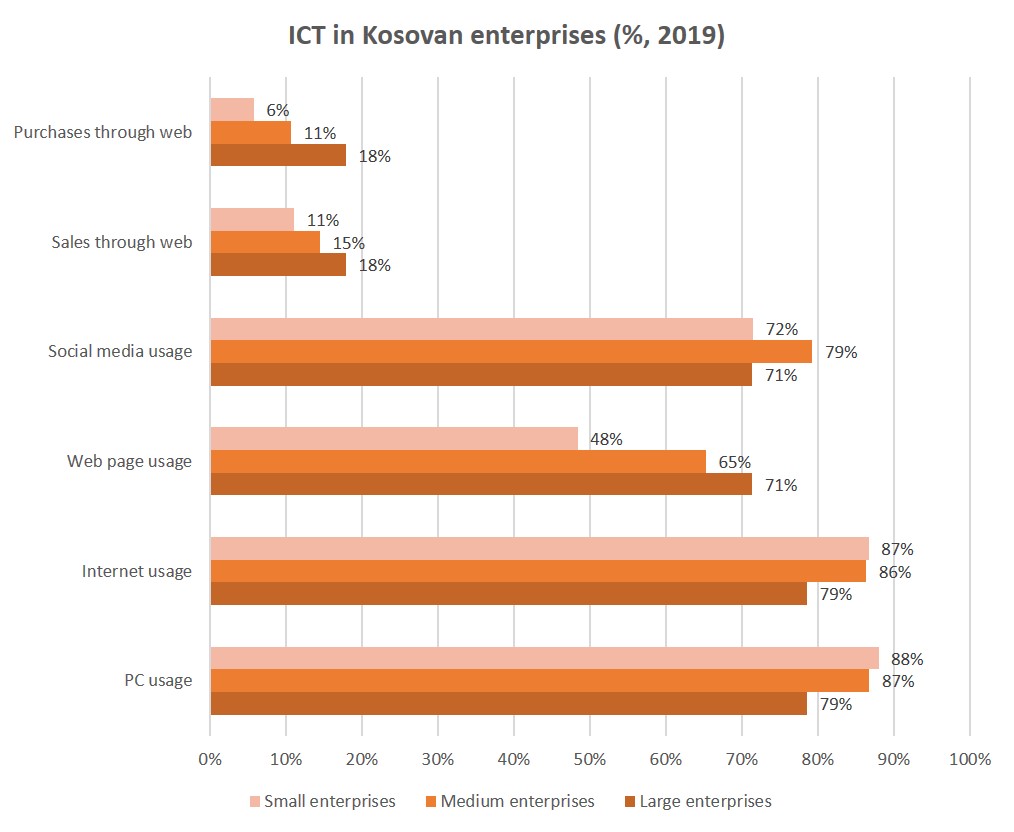The importance of Information and Communication Technology (ICT) in business cannot be overstated. ICT improves efficiency, effectiveness and allows businesses to promptly respond to customers’ needs. Drawing on the data of Kosovo Statistics Agency (year 2019), below we provide an overview of the use of ICT among Kosovan companies, based on the enterprise size. Specifically, we focus on the extend of Personal Computer (PC) usage, internet usage, web page usage, social media usage and electronic trade, namely sales and purchases through web. To classify firms, we rely on the number of employees criteria (European Commission, SME Definition):

The results reveal interesting patterns of ICT use in Kosovan enterprises. Whereas some of the findings are very promising, especially for small and medium-sized enterprises (SMEs). For example, looking at the PC and internet usage indicators, we note that the percentage of SMEs that use PC and internet is higher compared to large enterprises. Generally speaking, smaller companies usually operate in sectors (e.g., service sector) where PC and internet access are pivotal for their staff to perform daily business activities. The relatively high percentage of SMEs that use PC and internet is also a positive sign indicating that the sector is maturating and the level of professionalism among SMEs is increasing. On the other hand, large companies which consequently have more employees operate in sectors, (e.g., manufacturing) where generally speaking, one PC per employee or internet access is not necessarily required. Moreover, larger companies rely extensively on advanced and expensive intranet networks for internal communication instead of open internet connection.
Another positive finding revolves around social media usage. The results reveal that on percentage, there are more SMEs that use social media compared to larger enterprises. Kosovan SMEs use social media for promotion and interacting with clients as they are more convenient, affordable, and can easily target their clientele. Again, the large percentage of SMEs using social media indicates that these companies clearly understand the relevance of such channels therefore they heavily leverage on them. In contrast, we believe that larger firms use social media less mainly because they focus on other channels (i.e., television, web page, Google advertising) which are more sophisticated and appropriate to reach their target clients. Also, large companies have financial capacities to spend more in these channels, compared to smaller firms which usually have a limited budget. As the scale of the company gets smaller the usage of social media is more linked to the personal social media use of the owner/manager. The awareness on use of social media as a corporate tool in MSMEs is an important issue to raise. It is the most liberal habitat as for the market communication where the difference between the small and big companies are minimal with respect to their capital and corporate power. That’s why social media is offering opportunities for MSMEs for a stronger existence then their size in the market.
However, there is a different story when we examine other indicators. First of all, the data above shows that the percentage of SMEs that use web page is comparably lower than of large companies. We believe that the reason why not many SMEs use web page is because they don’t have one and developing and maintaining a web page can be expensive for them. This is in line with abovementioned argument why these companies decide to stick to social media. Secondly, a similar situation exists concerning the electronic trade. Meaning, compared to large companies, a smaller percentage of SMEs engage in electronic trade or sales/purchase through web. This is of course related to the first point; SMEs which don’t use a web page are less likely engage in electronic trade as well mainly due to high investment costs and lack of expertise. But they can make use of digital marketplaces in local or global scale. By the additional effect of the pandemics many MSMEs are pushed towards the use of digital sales through digital marketplaces. MSMEs and their owners/managers should be encouraged to approach to such marketplaces and start to have some influx of revenue from that channel in addition to the conventional distribution channels.
Notwithstanding, the Covid-19 pandemic showed the importance of online commerce. In this sense, SMEs should consider shifting towards sales through web as customers’ habits have already changed. For this reason, we provide three options that SMEs in Kosovo might consider for online sales:
